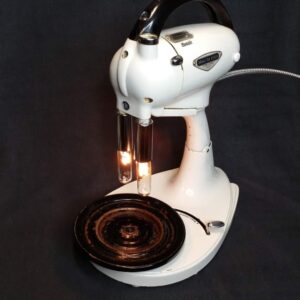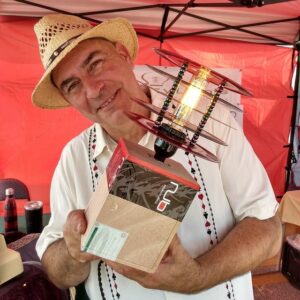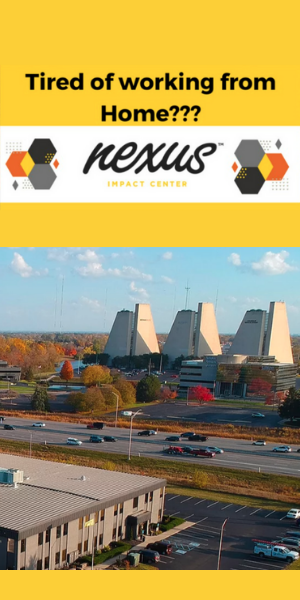Meet Eric Klinkowski, Chief Luminary of SmokEy Lights. Eric creates unique, purposeful pieces of small-scale installation art—better known as lamps. Each SmokEy Light is crafted with care and many include repurposed pieces—the Chief Luminary delights in rescuing forgotten relics of our past and giving them new life. Since 2016, SmokEy Lights has been creating “hot lights for cool places!” Get to know the Chief Luminary himself as he shares how he combined creativity, sustainability, and the Six Sigma process to build a business doing what he loves while inspiring others.
What inspired you to start SmokEy Lights?
I read about Depression Era creativity. Cigar box lamps were a necessity when people took what they had and made the best out of it. Appalachian know-how, if you will. I began making these lamps as a hobby to appreciate the notion, especially with the recent enthusiasm for Edison-style light bulbs. Then I began making them “my way,” and then, with encouragement, it became a way to challenge my creativity and imagination. When we started showing these pieces at art shows, the compliments kept me challenged to continue to improve my craft.
What drew you into this field?
Out of appreciation for history, I decided to make lamps. Pretty soon we had more lamps in each room than what was really needed. They became like rabbits. When I started sharing pictures of my creations, friends saw what I was doing and started asking about buying them. Once I discovered how happy and surprised people were to see a “SmokEy Light,” the business came naturally after that.
How did you establish your company name?
It just came down to a play on words. It invokes an image. A large portion of the name refers to the lamps that were made from cigar boxes. The capitalized “E” makes it more searchable and easier to find things.
Why is sustainability important to you?
Upcycling is superior to recycling because it takes so much energy to recycle. I prefer to use something that already exists without changing it much. It has the same kinetic value; you don’t have to change it. For a lot of these things, once they’re gone, they’re gone. Sometimes these items aren’t made anymore. For what it is, if I can upcycle that into a decorative piece, it’s more sustainable.
We collect stuff from all over the country. Every time we travel, we collect a variety of items. I have gone to both the west and east coast for family functions, and we like to take the back roads and look for interesting places. It’s like we’re playing our own game of “American Pickers.” We’re able to purchase interesting parts that way.

In regard to custom lamps, I started by making cigar box lamps. I realized if I could make a lamp out of that, I could make a lamp out of everything. Soon, clients started asking me to make customs. One client in particular asked me to make a mixer into a lamp. It was too old to use, but she can now put it on display as a sentimental reminder of her mother.
I have had a similar response to lamps I create out of old telephones. Although most people don’t use landlines anymore, the generations who grew up with those phones don’t want to get rid of them. It’s a piece of history, and I can help preserve that.
What philosophies or strategies are at the core of your business?
I enjoy different design aesthetics and applying them in unexpected ways. I’m especially driven by using an object like a derelict appliance or an industrial device, appreciating its styling, and then repurposing it in new ways. Just because something is old or doesn’t work, doesn’t mean it lacks meaning or style that can be appreciated. It can be reborn into something new. My creations cause people to look at the world differently. I sincerely always enjoy the look of joy and surprise that people have on their faces the first time they see our booth full of lamps fully lit. There’s a little bit of redemption in every lamp.
Why do you feel it is important to be known as a local business?
My mission is to make meaningful pieces that people appreciate and want to show off to others while upcycling, recycling, and reusing as much as I can in the process. I want to create things that solve problems on more than one level.

Every lamp has a story and a process for how it became what it is. Nothing we make is anonymous. I believe this is important. Every piece has a story, just like every person who lives in the community. You can’t go to Walmart and buy a SmokEy Light lamp, each one is influenced by its environment, history, and age–just like people. We source parts, pieces, and items from all over the country and we bring them back here to Indiana. I’d like to think in our own small way we help people identify and define their own style through our creations and experiences. When they buy from us, they share an experience and now own the story.
Best advice you’ve ever received (career-related or not)?
Two things:
- Continuous improvement. I apply some basic Six Sigma concepts in my creative process and it has allowed me to do more. The process is everything. Incomplete processes go into a notebook to be revisited.
- Tell your story and share your challenges with others. The best progress is a shared struggle. Some of the most unexpected advice comes from your customers, family, and friends. Sometimes the answer is in the past as well, go back, check your notes.
What advice would you give to those thinking of starting their own business?
Read about imposter syndrome and get over it early on. The sooner you understand your true value and what you have to offer, the better off your business will be and the happier you will be.
How did you overcome imposter syndrome?
It takes a while. It’s another form of fear that we put on ourselves. An example of this is when you come up with something, you think it’s not “enough” for someone to actually buy it. Nobody wants to be an outlier. It’s one of those things where you see talented people devalue their art or talent because they don’t want to be judged. The good news is, it’s all in your head. Entrepreneurs start out doing what they love but can sell themselves short by not understanding their real value. Knowing your value is imperative.
What is one challenge you face in your industry?
Everyone has a boring lamp somewhere in their home. It’s hard to convince some people that life is too short for boring lighting. Seriously, fill your space with things you enjoy experiencing.
What is one fun fact about yourself that people may not know about?
I’m a fan of Jack White. I remember watching a video of him taking three strings, a hammer, some nails, junk, and an old green coke bottle and within minutes he was playing music on it. This is what I strive to do with my lamps. Taking simple artifacts, creating a whole idea, a feeling, and making something that can be enjoyed over and over that resonates with the user. I just wish I were as quick and talented as Jack!
Anything else we should know?
I want to thank Ed Piroska, Jack, and Oz at Pipe Puffer Cigar Shop, across from the Greenwood Park Mall for all their support and encouragement for me over the years. I encourage anyone who enjoys cigars to go and check out Pipe Puffer’s selection.
I also want to emphasize that all power cords, sockets, switches, and electrical components are purchased from American companies, and all are UL listed.
Click here to learn more about SmokEy Lights. To make sure you never miss an update, you can follow them on Instagram and Facebook!
Want to be our next featured member? Sign up to become an Indiana Owned member today, and explore all the benefits of joining the community here!
Featured Images: Instagram (@smokeylights)




















